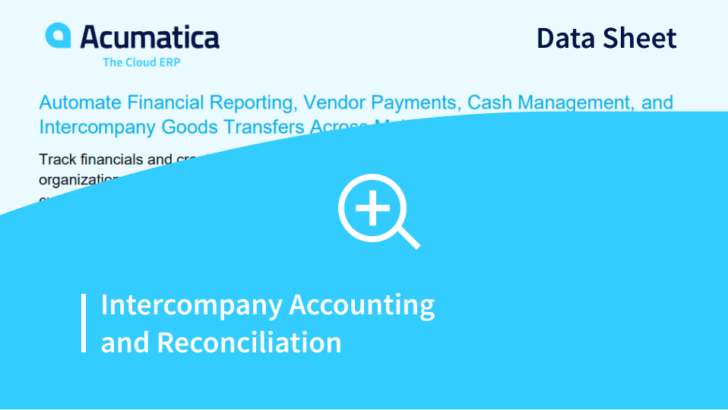Intercompany accounting is a crucial process for any company that has at least one subsidiary. It involves removing from the financial books any transactions that occurred between the company’s entities. This intercompany reconciliation greatly reduces the chance of inaccuracies in the company’s financial statements.
How Intercompany Accounting can work for you
Acumatica Intercompany Accounting lets you automate financial reporting, inventory transfers, vendor, payments, cash management, and inter-company transfers across multiple related companies. You can track financials and create reports for an unlimited number of related companies within your organization. Related companies can share charts of accounts, calendars, and currencies, as well as non-financial data. Restrict user access to customer or vendor records by branch or company.
Acumatica system integration enhances all your intercompany reconciliation activities. For example, you can manage intercompany payments in Accounts Payable and centralize invoicing in Accounts Receivable. You can also manage intercompany journal transactions, intercompany goods transfers, company-specific cash accounts, and more.
Key Benefits of Intercompany Accounting for your Company
-
Centralized Accounting
Centralize cash management, vendor payments, and customer invoicing while maintaining income and expense attribution to the initiating company.
-
Customized Reports and Inquiries
Deliver customized reports across one, selected, or all companies with integrated query and reporting tools. Financial reporting tools can eliminate inter-company transactions on company-wide reports.
-
Role Based Access
Control access to specific companies and associated transactions based on roles and groups of users. Users with access to multiple companies can rapidly switch views without logging in again.
-
Close financial periods by company
Manage financial periods separately for each company, including posting to closed periods. Activate and deactivate financial periods for posting for a particular company, and close books separately in each company within the tenant.
-
Company and branch selection
Navigate between companies and branches that represent separate legal entities, as well as companies with branches that exist within the same legal entity.
Important Features of Intercompany Accounting
Prevent potential intercompany reconciliation problems by allowing intercompany transactions only for specific accounts.
Centralize purchasing and invoicing through integrated Accounts Payable (AP), Accounts Receivable (AR), and Sales Order Management (SO). Purchase items and create sales orders in other companies with appropriate approvals.
Link bank accounts to specific companies for their exclusive use. Assign cash accounts to specific companies in the Cash Management (CA) module.
Assign and track fixed assets to specific companies in the Fixed Asset (FA) management module. Transfer assets and bring depreciation and purchase history to the receiving company.
Allocate accounting transactions among companies for shared activities. Allocation can be automatic, according to pre-set definitions.
Create roles and groups of users that have access to specific companies and the associated transactions. Add users in seconds and maintain an audit trail of user activities.
Manage financial periods separately for each company. Activate and deactivate financial periods for posting for a particular company, and close books separately in each company within the tenant.
Navigate between companies and branches that represent separate legal entities, as well as companies with branches that exist within the same legal entity.
Companies having multiple legal entities within the same tenant can have different fiscal year-end dates. Organizations can accelerate implementation; simplify maintenance for companies that share vendors, stock items, and employees; run consolidated operational reports at any time; and facilitate the preparation of consolidated financial statements.
When companies within a tenant buy and sell services from one another, once an AR invoice is created in one company, the system can automatically create an AP bill in the corresponding Acumatica entity and link the documents together.
Restrict user access to customer or vendor records by branch or company for better security.



